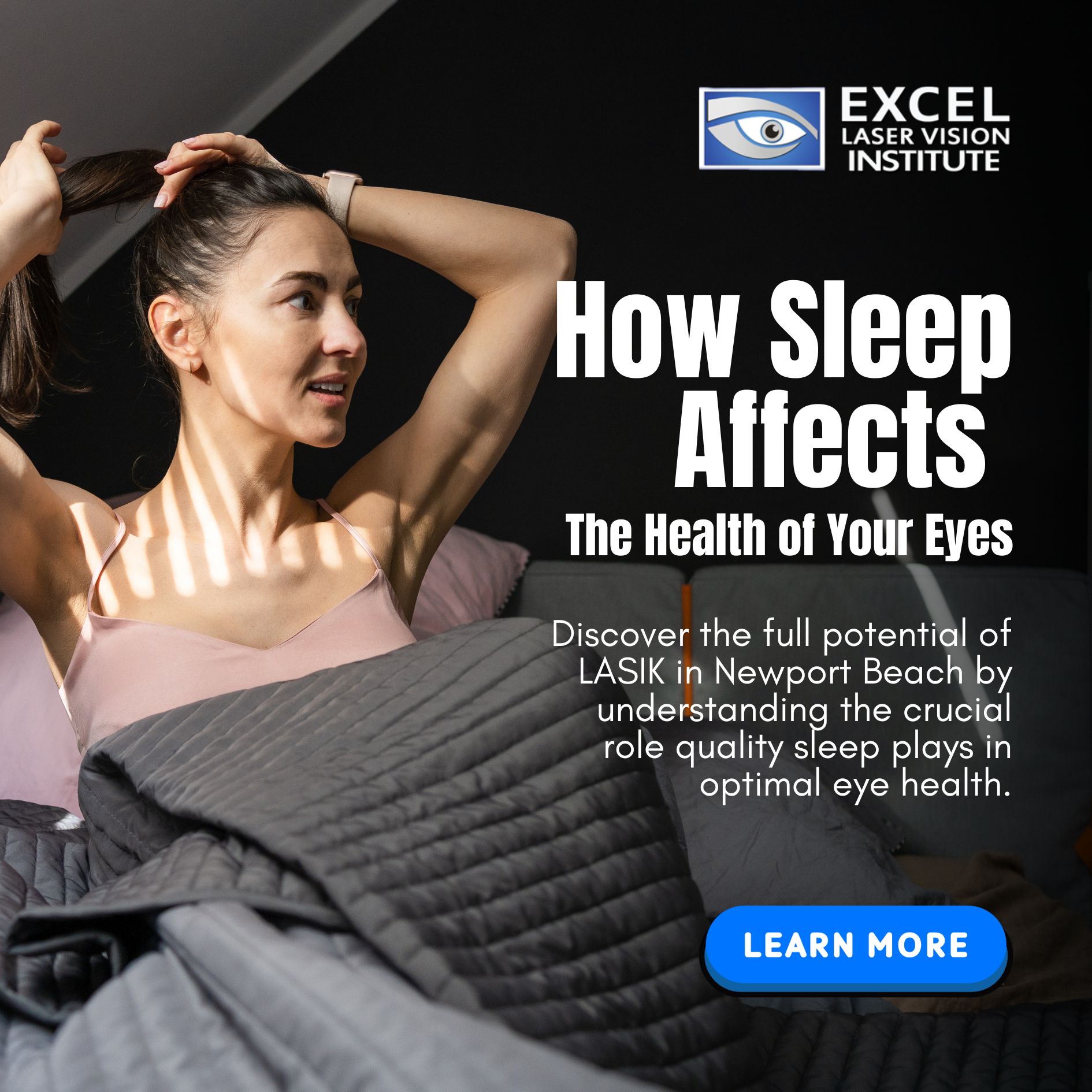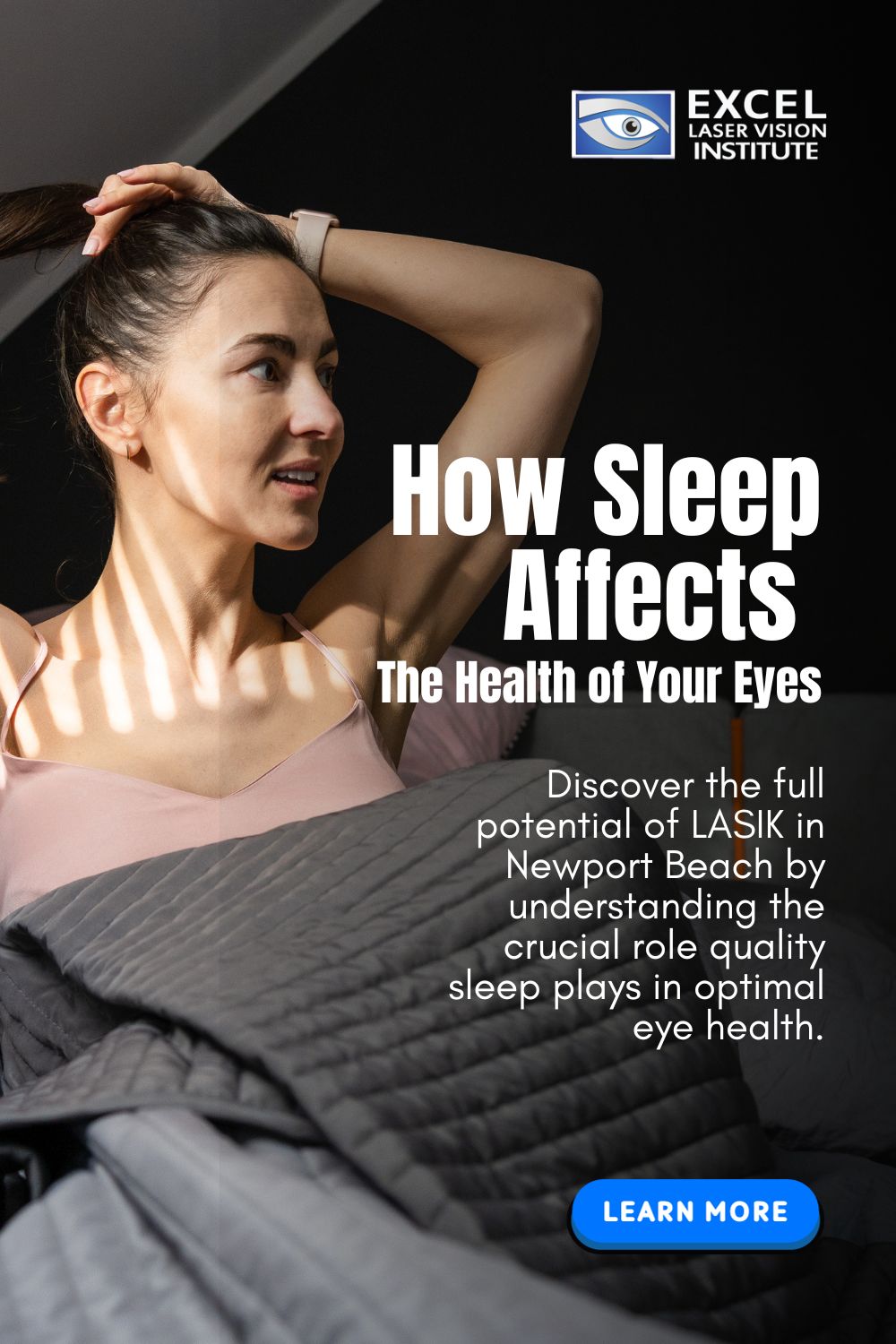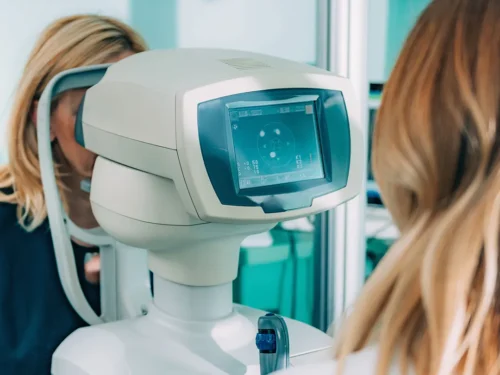
Quality sleep is a universal necessity crucial for the holistic health of all living beings, especially when considering advanced eye care procedures like LASIK in Newport Beach. While the significance of sleep for mental clarity, mood regulation, and physical rejuvenation is well-known, its profound effects on eye health and vision are often underestimated. Let’s delve deeper into the symbiotic relationship between a good night’s sleep and optimal eye health.
Restorative Power of Sleep
The eyes are constantly active throughout waking hours, rushing, adjusting to different light conditions, and focusing on various distances. Just as our body requires rest after a day of activity, our eyes benefit from sleep’s uninterrupted break. During sleep, vital nutrients and compounds are replenished, helping heal any minor damages the eyes might have encountered during the day.

Prevention of Dry Eye
Dry eye syndrome is a common and uncomfortable condition where the eyes do not produce enough tears or the right quality of tears to stay nourished and lubricated. One contributing factor to dry eye can be a lack of sleep. Adequate rest ensures the eyes have enough time to rejuvenate and maintain a balanced tear film, which is essential for clear vision and comfort.
Reducing Eye Strain
Prolonged screen time, reading, or any continuous focus-intensive task can lead to eye strain. Symptoms include blurred vision, headaches, and eye discomfort. Chronic lack of sleep exacerbates these symptoms. Conversely, a good night’s sleep can significantly alleviate eye strain and its associated symptoms.
Dark Circles and Puffiness
Insufficient sleep often results in dark circles and puffiness around the eyes. This is due to fact that your blood vessels are dilating and accumulating fluid in the region. Over time, chronic sleep deprivation could lead to persistent and pronounced dark circles, making the eyes appear tired and aged.
Twitching (Myokymia)
Eyelid twitching, medically termed myokymia, can be an annoying condition. While it’s usually harmless, one common cause is fatigue resulting from inadequate sleep. Ensuring a consistent sleep schedule can help reduce or eliminate such involuntary twitches.
Vision Sharpness
Lack of sleep can affect the sharpness of vision. People might experience slightly blurred vision or difficulty focusing after a night of insufficient rest. These symptoms typically resolve after catching up on sleep but indicate the eyes’ need for rest and recovery.
Cellular Regeneration
Sleep is the body’s natural time for healing and regeneration. For the eyes, this means the repair of minor damages, such as those caused by ultraviolet rays. Consistent quality sleep ensures the eyes have the necessary downtime to undergo these regenerative processes.
Reducing the Risk of Eye Conditions
While research is ongoing, some studies suggest that chronic sleep deprivation may increase the risk of certain eye conditions, including glaucoma. This underscores the potential long-term benefits of consistent restful sleep for eye health.
Neurological Benefits
Vision isn’t just about eye health; it’s a complex interplay between the eyes and the brain. The optic nerve, responsible for transmitting visual information from the retina to the brain, functions optimally when the eyes and the brain are well-rested.
Conclusion
In conclusion, the significance of sleep transcends beyond mere rest; it’s an essential component for the maintenance and optimization of visual health. Whether you’re preparing for an advanced vision correction procedure or maintaining the health of your eyes post-LASIK, prioritizing restful nights is a vital investment. In our modern world, where screens dominate and sleep often takes a backseat, committing to quality sleep is not just a matter of feeling refreshed. It’s an essential step toward ensuring a transparent, comfortable, and healthy vision, enhancing the transformative benefits of LASIK in Newport Beach.
10 Ways Sleep Deprivation Affects Vision
Lack of sleep can profoundly impact various aspects of health, and eye health is no exception. Like the rest of the body, the eyes require adequate rest to function optimally. When sleep is compromised, it can lead to several adverse effects on the eyes. Here’s how the lack of sleep affects eye health:
Dry Eyes
One of the most common consequences of insufficient sleep is dry eyes. During sleep, the eyes are naturally lubricated and moisturized. When lacking sleep, the eyes may not receive the necessary moisture, leading to dryness, irritation, and a gritty sensation.
Eye Twitching
Lack of sleep can contribute to eye twitching or myokymia. This involuntary movement of the eyelid is often linked to fatigue and stress. Adequate sleep allows the eye muscles to relax and reduces the likelihood of twitching.
Blurry Vision
Insufficient sleep can cause temporary blurred vision. Fatigue can affect the eye muscles, making it challenging to focus correctly. This can result in blurry vision, difficulty reading, and a general decrease in visual acuity.
Eye Strain and Discomfort
Prolonged periods of wakefulness can lead to eye strain. Staring at screens, whether computers, smartphones, or televisions, without adequate rest can cause discomfort, headaches, and overall eye fatigue.
Increased Sensitivity to Light
Lack of sleep can make the eyes more sensitive to light. This heightened sensitivity and photophobia can lead to discomfort and squinting in bright environments.
Impaired Focus and Concentration
Sleep deprivation affects cognitive function, including focus and concentration. This can impact the eyes’ ability to maintain clear vision and process visual information efficiently.
Increased Risk of Eye Diseases
Chronic sleep deprivation has been associated with an increased risk of certain eye conditions, such as glaucoma and age-related macular degeneration (AMD). A compromised immune system due to lack of sleep may contribute to the development or progression of these diseases.
Decreased Production of Tears
Adequate sleep is crucial for maintaining the health of the lacrimal glands, which produce tears. Lack of sleep can reduce tear production, leading to dry eyes and an increased risk of irritation.
Dark Circles and Puffiness
Insufficient sleep can result in dark circles under the eyes and puffiness. This is often due to poor circulation and fluid retention, making the eyes appear tired and swollen.
Impaired Healing
Sleep is essential for the body’s overall repair and regeneration processes. When the eyes are deprived of sufficient rest, their ability to heal from daily wear and tear may be compromised, leading to prolonged recovery times for any eye-related issues.
Conclusion
In conclusion, adequate sleep is crucial for maintaining optimal eye health. Chronic sleep deprivation can contribute to various eye problems, from discomfort and dryness to more severe conditions. Prioritizing healthy sleep habits is essential for overall well-being, including the health of your eyes. If you consistently experience eye-related issues, it’s essential to consult with an eye care professional for personalized advice and intervention. You should also consider visiting a sleep specialist so they can assess your problems with sleep and come up with possible cures, as lack of sleep can affect the health of more than just your eyes.



